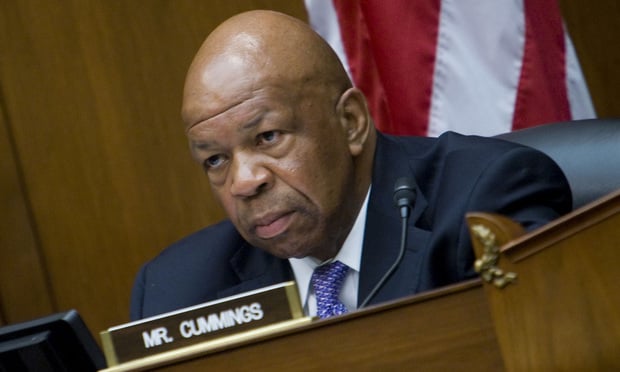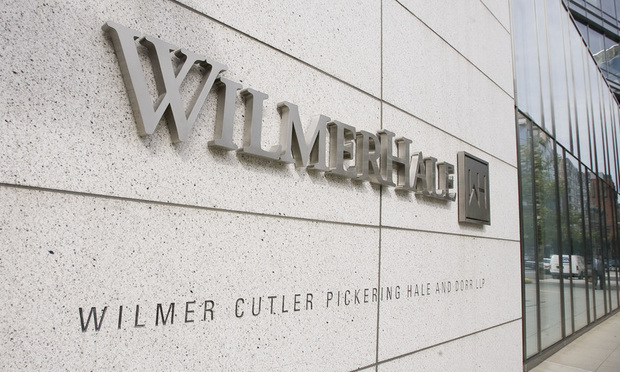US House Democrats Just Made It Easier for Investigators to Depose Witnesses
For a decade now, US House rules required a member to be present for a deposition. Not anymore.
January 04, 2019 at 05:33 PM
6 minute read
 U.S. Representative Elijah Cummings (D-MD), during a Committee on Oversight & Government Reform hearing in 2011. Photo: Diego M. Radzinschi/The National Law Journal
U.S. Representative Elijah Cummings (D-MD), during a Committee on Oversight & Government Reform hearing in 2011. Photo: Diego M. Radzinschi/The National Law Journal
U.S. House Democrats are making it easier for a key committee's lawyers to question corporate executives and administration officials who might face the glare of an investigation, removing a procedural hurdle that had long required a lawmaker to sit in on a deposition.
For the past decade, that requirement has complicated congressional investigations, forcing House lawyers to coordinate with various offices to ensure that at least one lawmaker would be present for every second of a deposition. Without a member of Congress present, depositions could not proceed unless the target of an investigation waived the attendance rule.
As part of a new rules package, House Democrats dropped that rule for the House Oversight and Reform Committee, a move that underscored their interest in pursuing investigations into the Trump administration and companies in sectors ranging from tech to financial services. The new rule reverts back to the standard in place the last time Democrats held the House—the 2009-10 session.
Indeed, lawyers who handle congressional investigations said the rule change removes a rein on House staff. The rule change was “significant,” said one veteran defender, Reginald Brown, chairman of the the financial services practice at Wilmer Cutler Pickering Hale and Dorr.
“In the past, the time commitment for a member has been a real issue. And relieving them of the obligation to show up gives the staff more leverage,” said Brown, who counseled Google CEO Sundar Pichai along with Facebook executives Mark Zuckerberg and Sheryl Sandberg ahead of their questioning by lawmakers last year.
 Wilmer offices in Washington, D.C. Photo: Diego M. Radzinschi / NLJ
Wilmer offices in Washington, D.C. Photo: Diego M. Radzinschi / NLJBrown said private lawyers can gather a sense—whenever a member of Congress does participate in a deposition—whether a particular matter might be worthy of a public hearing. “That exercise of judgment about the hearing 'worthiness' of a particular witness is important and that may be lost,” Brown said. He added that a lawyer for a witness might want a member of Congress to show up for at least part of a deposition, even if the appearance is not required by a rule.
The House oversight committee, led by U.S. Rep. Elijah Cummings, D-Maryland, is expected to take a leading role investigating Trump. “Over the last two years, President Trump set the tone from the top in his administration that behaving ethically and complying with the law is optional,” Cummings said Friday.
A White House spokesman did not respond to a request for comment.
Cummings, who has long sparred with pharmaceutical executives over drug prices, has signaled that his committee's oversight will target not only the Trump administration but also the private sector.
On Jan. 2, announcing plans to drop the word “government” from what was formerly known as the Committee on Oversight and Government Reform, Cummings said the name change would better reflect the committee's “true jurisdiction, which covers both government and the private sector.”
“In the upcoming session of Congress, we will investigate waste, fraud, and abuse in the Trump administration, and we will also examine many other issues that affect the American people every day, such as the escalating prices of prescription drugs that are negatively impacting families across the country and the opioid crisis that is devastating our communities,” Cummings said.
Thomas Hungar, a former Gibson, Dunn & Crutcher appellate partner who had served as general counsel to the House since 2016, described the rule change as a “wise decision” by Democrats and said it would allow committee lawyers to more easily pursue expedited, witness-intensive investigations.
For targets of investigations, Hungar said, the rule change could usher in more aggressive scheduling demands and give defense lawyers “less ability to try to monkey with the schedule by playing games designed to capitalize on the difficulties that can be presented when you have a limited number of members and limited days in which members are going to be in town.”
“It's not an earth-starring change. But in terms of the flexibility and efficiency of the process, I think it will be a significant help to the new majority,” said Hungar, who declined to comment on his post-House plans. (House Speaker Nancy Pelosi, D-California, last week picked veteran former Justice Department lawyer Douglas Letter as the new general counsel.)
In interviews, former congressional lawyers described depositions as among the most powerful tools they had to spur targets of investigations to promptly produce documents or respond to interrogatories. But the attendance rule would occasionally serve as a drag on their ability to credibly threaten depositions.
McDermott Will & Emery counsel Sam Dewey, who served for the past two years as a senior counsel on the Republican-led House Financial Services Committee, said the rule change would make the threat of a deposition “much more salient” and free congressional lawyers from the having to “worry about having dark periods during which they are largely unable to conduct depositions, such as the four to six weeks when everyone is in recess over the summer.”
“One of the most effective tools as a congressional investigator to induce compliance is the threat of saying, 'OK, you're not complying, so I'm going to depose someone to find out why.' People react differently when they're personally answering for something under oath,” Dewey said. “Generally in-house counsel, agency general counsels, executives at a companies do not like having to personally explain why the committee doesn't have the information it requested.”
The mere threat of a deposition, Dewey added, “will allow you as an investigator to get documents more quickly, to get written answers more quickly, really to get all sorts of information.”
Read more:
Verrilli Gets US House Call to Defend Obamacare
House Democratic Majority Builds Legal Team as Republicans Scram
Pelosi Picks Ex-DOJ Appellate Vet Douglas Letter as House General Counsel
'Undefeated and Unindicted' Trey Gowdy Shares Plans for Nelson Mullins Role
Michael Bromwich Looks Back—and Ahead—After Kavanaugh-Ford Hearings
This content has been archived. It is available through our partners, LexisNexis® and Bloomberg Law.
To view this content, please continue to their sites.
Not a Lexis Subscriber?
Subscribe Now
Not a Bloomberg Law Subscriber?
Subscribe Now
NOT FOR REPRINT
© 2025 ALM Global, LLC, All Rights Reserved. Request academic re-use from www.copyright.com. All other uses, submit a request to [email protected]. For more information visit Asset & Logo Licensing.
You Might Like
View All
Antitrust in Trump 2.0: Expect Gap Filling from State Attorneys General
6 minute read

SEC Puts Beat Down on Ex-Wrestling CEO Vince McMahon for Not Reporting Settlements
3 minute read
Meta Hires Litigation Strategy Chief, Tapping King & Spalding Partner Who Was Senior DOJ Official in First Trump Term
Trending Stories
Who Got The Work
J. Brugh Lower of Gibbons has entered an appearance for industrial equipment supplier Devco Corporation in a pending trademark infringement lawsuit. The suit, accusing the defendant of selling knock-off Graco products, was filed Dec. 18 in New Jersey District Court by Rivkin Radler on behalf of Graco Inc. and Graco Minnesota. The case, assigned to U.S. District Judge Zahid N. Quraishi, is 3:24-cv-11294, Graco Inc. et al v. Devco Corporation.
Who Got The Work
Rebecca Maller-Stein and Kent A. Yalowitz of Arnold & Porter Kaye Scholer have entered their appearances for Hanaco Venture Capital and its executives, Lior Prosor and David Frankel, in a pending securities lawsuit. The action, filed on Dec. 24 in New York Southern District Court by Zell, Aron & Co. on behalf of Goldeneye Advisors, accuses the defendants of negligently and fraudulently managing the plaintiff's $1 million investment. The case, assigned to U.S. District Judge Vernon S. Broderick, is 1:24-cv-09918, Goldeneye Advisors, LLC v. Hanaco Venture Capital, Ltd. et al.
Who Got The Work
Attorneys from A&O Shearman has stepped in as defense counsel for Toronto-Dominion Bank and other defendants in a pending securities class action. The suit, filed Dec. 11 in New York Southern District Court by Bleichmar Fonti & Auld, accuses the defendants of concealing the bank's 'pervasive' deficiencies in regards to its compliance with the Bank Secrecy Act and the quality of its anti-money laundering controls. The case, assigned to U.S. District Judge Arun Subramanian, is 1:24-cv-09445, Gonzalez v. The Toronto-Dominion Bank et al.
Who Got The Work
Crown Castle International, a Pennsylvania company providing shared communications infrastructure, has turned to Luke D. Wolf of Gordon Rees Scully Mansukhani to fend off a pending breach-of-contract lawsuit. The court action, filed Nov. 25 in Michigan Eastern District Court by Hooper Hathaway PC on behalf of The Town Residences LLC, accuses Crown Castle of failing to transfer approximately $30,000 in utility payments from T-Mobile in breach of a roof-top lease and assignment agreement. The case, assigned to U.S. District Judge Susan K. Declercq, is 2:24-cv-13131, The Town Residences LLC v. T-Mobile US, Inc. et al.
Who Got The Work
Wilfred P. Coronato and Daniel M. Schwartz of McCarter & English have stepped in as defense counsel to Electrolux Home Products Inc. in a pending product liability lawsuit. The court action, filed Nov. 26 in New York Eastern District Court by Poulos Lopiccolo PC and Nagel Rice LLP on behalf of David Stern, alleges that the defendant's refrigerators’ drawers and shelving repeatedly break and fall apart within months after purchase. The case, assigned to U.S. District Judge Joan M. Azrack, is 2:24-cv-08204, Stern v. Electrolux Home Products, Inc.
Featured Firms
Law Offices of Gary Martin Hays & Associates, P.C.
(470) 294-1674
Law Offices of Mark E. Salomone
(857) 444-6468
Smith & Hassler
(713) 739-1250










